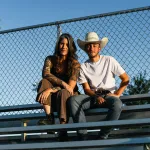To commemorate Transgender Day of Visibility, Remington Johnson will speak at a weekend rally on the the steps of the Texas Capitol — a moment of self-care and empowerment as she joins advocacy groups and other trans people gathering in solidarity.
“When I get a microphone and I get to be visible, I get to be reminded of how powerful I am,” she said ahead of the rally, which at least 250 people plan to attend, based on Facebook responses.
Transgender Day of Visibility (TDOV), celebrated annually on March 31, is a moment to celebrate the lives of trans people and to raise awareness of injustices they face. This year, it carries a special significance for some transgender Texans: Trans people still living in the state, as well as those who have moved away for school or work, told The 19th that they are thinking about how to use their own voices to uplift trans youth — and about what being visible ultimately means to them.
At six feet, two inches and 200 pounds, visibility is a given for Johnson, she says.
“There sort of is no way for me to not be visible,” Johnson said. To her, TDOV is an “explicit moment where the trans community gets to stand together and say, ‘we have power, you will perceive me’ … I think there’s something really powerful and sacred and beautiful about that. In being visible, we are powerful.”
Johnson has frequently testified against anti-trans bills, especially last year, when Texas saw an avalanche of legislative attacks on gender-affirming care and access to school sports for trans youth. By taking the microphone at the rally on April 2, the 36-year-old hopes to comfort other people in her community at a time of great trauma and inspire restraint among lawmakers.
That moment comes as the fight over gender-affirming care for minors in Texas has picked up speed. State Attorney General Ken Paxton is pushing a legal battle over whether families of trans children can be investigated for child abuse if they seek gender-affirming care, which he attempted to block via a nonbinding legal opinion earlier this year. Paxton has also announced a probe into puberty-suppressing drugs, considered life-saving care by families of trans kids and many physicians who work with them.
-
Read Next:
Being visible, including on TDOV, reassures Noor Pervez, a 26-year-old nonbinary trans person, that he is doing something for the next generation of trans kids. Pervez moved from North Texas — where he grew up — to Washington, D.C., about three years ago to start work with the Autistic Self Advocacy Network.
“It makes me feel like I can be the kind of person that I needed as a kid,” he said in an interview. What he needed during his childhood, he said, was some sign that he had a future as a queer, South Asian Muslim and autistic person.
“Every visible trans Muslim and trans South Asian is critical,” he said in an email. “The shame drives people in both communities to death long before we reach out to others, and quite often. Any small piece that I can do to combat that is mandatory, as far as I am concerned.”
While being visible is an important way for Pervez to show younger trans kids that they have a future, he also recognizes some of the challenges of being out — including harassment and being denied employment or access to basic resources.
Johnson also noted that being visible can come at a cost — especially when some people aren’t able to choose to be visible or not — but that this year, she believes trans adults have a responsibility to show trans youth that they deserve to be seen.
“I think this year, maybe more than ever, trans visibility is really important,” she said. “Because trans children have to be invisible for their safety.”
Pervez also plans to meet up outdoors with friends on TDOV to celebrate little victories — like his recent breakthroughs in therapy. He feels grateful — and also guilty — that it is easier for him to be who he is as a queer, trans disabled person in Washington than in Texas. The news cycle in Texas has only made that guilt grow.
“Every single nightmare that I had growing up as a queer kid in Texas is just happening right now,” he said.
For many trans Texans, that nightmare has been ongoing since last year. But on TDOV, making space for joy and community — without having to advocate or fight — is all-important.
For Emmett Schelling, executive director of the Transgender Education Network of Texas, it’s crucial to create a space in Austin on March 31 for trans Texans to gather and enjoy themselves without an agenda, and without the need to relive the trauma of fighting in the past legislative sessions.
“When we can be in the same place with one another, it automatically gives a certain degree of relief or exhale,” he said. “I think it’s healing for us when we’re dealing with all of this.”
While Schelling said he doesn’t know if this year’s TDOV is more important than previous years, he believes there has been a broader shift in trans visibility over the last five years — with more trans people in jobs that aren’t directly tied to trans advocacy.
Moments of visibility have meant a great deal to Jennifer Kramer, who transitioned two years ago. Kramer, 44, who lives in Austin with her wife and two kids and works as an engineering manager, said that TDOV is important to her because of the examples set by others. “Visibility was the only thing that got me out of the closet,” she said.
“Seeing people who were older like me and whose stories echoed my own, or people in communities I was a part of who were cute and celebrated, that made it impossible to deny anymore,” she said.
Last year was Kramer’s first TDOV celebration after coming out. Then, she had called attention on social media to anti-trans bills proliferating around the country. This year, aside from attending the April 2 rally, she plans to highlight in social media posts how fights surrounding trans rights in Texas and other states have “gotten significantly worse.”
Charis Sharp, a 21-year-old psychology student living in Hawaii, moved from Texas in the summer of 2020 for school. This TDOV feels more important and more special to her than previous years, she said.
For TDOV, she makes leis — symbols of hope and welcoming — to give to her friends and family. The day is also the time to celebrate trans perseverance in the face of what the community is going through.
“This day … is to celebrate and to find joy in that, we’re still here, we’re still fighting,” she said.
Celebrating herself is also an important part of the day. Living as herself and, as she puts it, as the woman she was born to be, is in itself a fight to destroy stereotypes of trans people.
This year, Sharp is also carrying an “almost overwhelming” amount of stress for transgender youth in Texas. The news affects her personally in multiple ways, including her own transition, since she received crucial gender-affirming care from a Dallas clinic that closed to new patients after it came under political pressure last year.
“I have to take breaks from the news,” she said. Despite that, she said she is still hopeful that trans youth will be able to receive care in Dallas and across the state.
Adri Pérez, 29, a policy and advocacy strategist at the ACLU of Texas, reflected that for the past few years, TDOV has aligned with the end of legislative sessions and bill filing deadlines for many states. Since 2020, the day has been accompanied with a growing sense of dread and urgency, they said.
“I remember 2020 Trans Day of Visibility coming and feeling like the attacks in the state legislatures were unprecedented and feeling very afraid, and then having the same thing happen in 2021. And now it’s 2022 and it is worse.”
While most of their TDOV plans center around advocacy work for the ACLU, they also plan to meet a friend who offered to buy them breakfast for the day. They also plan to be in El Paso on Thursday to unplug in the desert.
The day itself was more important to Pérez in the past than it is now, they said — partially because they looked to the day as a greater source of assurance and validation.
“It means more to me to be able to use that day … to make other people feel seen,” they said.








